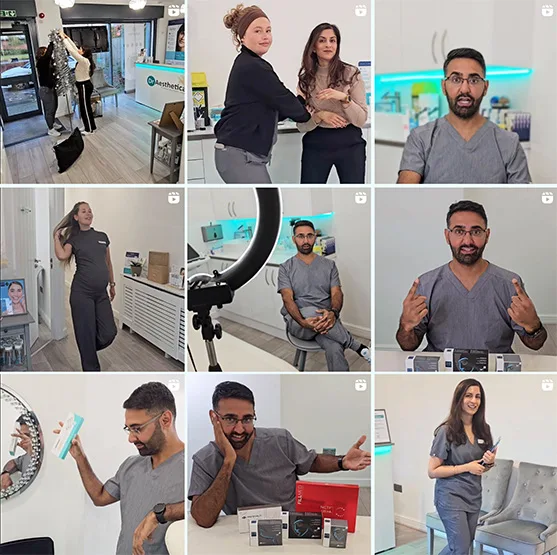Living with rosacea can be challenging. This skin condition often causes redness, visible blood vessels, and sometimes bumps resembling acne. Rosacea affects many people in the West Midlands and can impact your confidence and comfort. Knowing how to manage rosacea is vital to keeping your skin healthy and reducing flare-ups.
Numerous treatments, from topical creams to more advanced therapies, are also available to help control rosacea. Incorporating specific daily skincare routines can further help manage symptoms. By understanding these aspects, you can take control of rosacea and keep your skin looking and feeling its best.
Understanding Rosacea and Its Symptoms
Rosacea is a long-term skin condition that primarily affects the face. It often begins with a tendency to blush or flush more quickly than others. As the condition progresses, redness becomes more persistent, especially around the nose and cheeks. Visible blood vessels, known as telangiectasia, can also appear. In some cases, people develop small, pus-filled bumps that resemble acne.
Another common symptom is eye irritation. This form, called ocular rosacea, can make your eyes feel dry and gritty or even cause conjunctivitis. If left untreated, it can lead to more severe eye problems. Rosacea symptoms can come and go, and certain factors or triggers can worsen the condition.
Additional symptoms can include a burning or stinging sensation on the skin, facial swelling, and skin thickening, especially around the nose. This thickening can cause the nose to appear bulbous, known as rhinophyma. Understanding these symptoms is the first step in managing rosacea effectively. You can better manage the condition and seek appropriate treatments by recognising and monitoring these signs.
Common Triggers and How to Avoid Them
Managing rosacea involves identifying and avoiding triggers that can worsen symptoms. Here are some common triggers and ways to avoid them:
1. Weather Extremes: Hot weather, cold weather, and wind can aggravate rosacea. Protect your skin by wearing a scarf in cold weather and using sunscreen during sunny days. Avoiding extreme temperatures whenever possible can help reduce flare-ups.
2. Spicy Foods and Alcohol: Hot and spicy foods and alcoholic beverages are known triggers. Try to limit these in your diet. Replacing spicy foods with milder options and choosing non-alcoholic drinks can make a significant difference.
3. Stress: Emotional stress is a common trigger for many people with rosacea. Practising stress-reducing activities like yoga, meditation, or simple breathing exercises can help manage flare-ups.
4. Hot Beverages: Drinking scalding coffee or tea can cause flushing. Let your beverages cool down before drinking, or switch to more astounding alternatives.
5. Certain Skincare Products: Some ingredients in skincare products can irritate rosacea-prone skin. Opt for products labelled as gentle and suitable for sensitive skin. Always patch-test new products before applying them to your entire face.
6. Sun Exposure: The sun can be harsh on rosacea-prone skin. Use a broad-spectrum sunscreen with at least SPF 30 daily. Wear wide-brimmed hats and seek shade whenever possible.
By being mindful of these common triggers and adjusting your lifestyle to avoid them, you can significantly reduce the frequency and severity of rosacea flare-ups. Recognising and avoiding triggers is crucial to an effective rosacea management plan.
Effective Treatments for Managing Rosacea
Treating rosacea involves a variety of approaches tailored to each individual's symptoms and triggers. Here are some of the most effective treatments available:
1. Topical Medications: Doctors often prescribe creams or gels containing metronidazole or azelaic acid. These help reduce redness and inflammation. Another option is topical ivermectin, which can target the mites that may exacerbate rosacea.
2. Oral Antibiotics: Oral antibiotics such as doxycycline can reduce inflammation and treat blemishes for moderate to severe cases. These medications can offer relief during flare-ups and help maintain clearer skin.
3. Laser and Light Therapy: Laser therapy and intense pulsed light (IPL) target visible blood vessels and reduce redness. These therapies can be particularly effective for persistent redness and visible veins.
4. Isotretinoin: Isotretinoin may be prescribed for severe cases unresponsive to other treatments. This potent medication can reduce oil production and manage severe symptoms but requires close medical supervision.
5. Brimonidine Gel: This prescription gel can temporarily constrict blood vessels, offering immediate relief from redness. Applied daily, it helps manage visible symptoms.
Consult a healthcare provider to determine the most suitable treatment plan for your rosacea. Combining different treatments can often provide the best results.
Daily Skincare Tips for Rosacea-prone Skin
Caring for rosacea-prone skin involves gentle and consistent routines that soothe and protect the skin. Here are some daily skincare tips:
1. Gentle Cleansing: Use a mild, fragrance-free cleanser to wash your face twice daily. Avoid scrubbing your skin, as this can irritate and worsen rosacea symptoms.
2. Moisturising: After cleansing, apply a gentle, non-comedogenic moisturiser to hydrate your skin. Look for products formulated for sensitive skin that will not clog pores.
3. Sun Protection: Use a broad-spectrum sunscreen with at least SPF 30 daily, even when it’s cloudy. Physical sunscreens containing zinc oxide or titanium dioxide are less likely to irritate your skin.
4. Avoid Harsh Products: Avoid skincare products containing alcohol, menthol, or fragrances. These can trigger flare-ups and worsen dryness and redness.
5. Cool Compresses: If your skin feels hot or irritated, applying a cool compress can provide soothing relief and help reduce temporary redness.
6. Patch Testing: Always patch-test new skincare products before using them on your face. This helps you see if you have any adverse reactions without causing widespread irritation.
These tips can help manage and reduce rosacea symptoms, providing relief and promoting healthier skin.
Conclusion
Managing persistent rosacea requires a comprehensive approach that includes understanding your symptoms, avoiding triggers, and choosing the right treatments. You can significantly reduce flare-ups and enjoy clearer, healthier skin by following effective treatment plans and daily skincare routines. Consistency and mindfulness are crucial to keeping rosacea under control.
At Dr. Aesthetica, we offer personalised microneedling in Birmingham to help manage your rosacea effectively. Our team of experts in the West Midlands is here to help you find the best treatments and skincare routines tailored to your needs. Contact Dr. Aesthetica today to start your journey towards healthier, happier skin.



